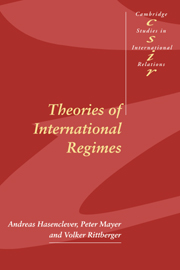Book contents
- Frontmatter
- Contents
- List of figures and tables
- Acknowledgments
- 1 Introduction: three perspectives on international regimes
- 2 Conceptual issues: defining international regimes
- 3 Interest-based theories: political market failure, situation and problem structures, and institutional bargaining
- 4 Power-based theories: hegemony, distributional conflict, and relative gains
- 5 Knowledge-based theories: ideas, arguments, and social identities
- 6 Conclusion: prospects for synthesis
- References
- Index
- CAMBRIDGE STUDIES IN INTERNATIONAL RELATIONS
6 - Conclusion: prospects for synthesis
Published online by Cambridge University Press: 05 September 2009
- Frontmatter
- Contents
- List of figures and tables
- Acknowledgments
- 1 Introduction: three perspectives on international regimes
- 2 Conceptual issues: defining international regimes
- 3 Interest-based theories: political market failure, situation and problem structures, and institutional bargaining
- 4 Power-based theories: hegemony, distributional conflict, and relative gains
- 5 Knowledge-based theories: ideas, arguments, and social identities
- 6 Conclusion: prospects for synthesis
- References
- Index
- CAMBRIDGE STUDIES IN INTERNATIONAL RELATIONS
Summary
In this book we have argued that three schools of thought coexist in the study of international regimes. Each of these schools focuses on a specific variable, which helps to define its identity. Neoliberals stress (self-) interest as a motive for cooperation among states and likewise for the creation of, and compliance with, international regimes. Realists emphasize how power and considerations of relative power position affect the content, and circumscribe the effectiveness and robustness, of international regimes. Cognitivists point out that both the perception of interests and the meaning of power capabilities is dependent on actors' causal and social knowledge. In recent years, vigorous debates have been conducted between realists and neoliberals (Baldwin 1993b; Kegley 1995) as well as between cognitivists and rationalists (Kratochwil and Mansfield 1994; Der Derian 1995). This suggests that juxtaposing these three schools of thought is not only a convenient way of classifying the ever-growing literature about international institutions, but is faithful to an intersubjective reality as well.
The reality of this paradigmatic pluralism does not entail its desirability, though. To the extent that power, interests, and knowledge interact in the production of international regimes, continuing to invest large amounts of each school's intellectual resources into sharpening differences and demonstrating superiority over competitors may hamper rather than further progress in our understanding of international institutions.
- Type
- Chapter
- Information
- Theories of International Regimes , pp. 211 - 224Publisher: Cambridge University PressPrint publication year: 1997



